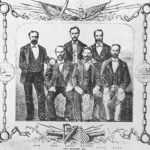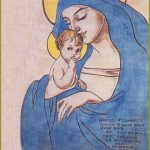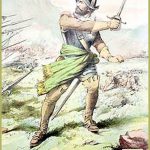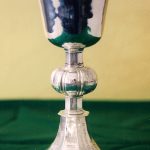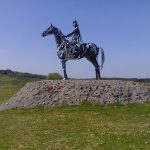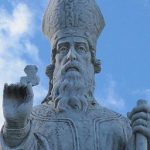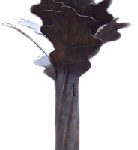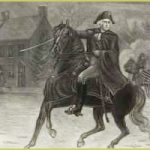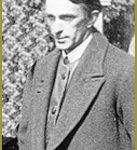In 1858, the Fenian brotherhood was founded in America and the Irish Republican Brotherhood (IRB) in Ireland to work for Irish independence. Britain declared membership in that organization a crime punishable by deportation to her penal colony in Freemantle, Australia. Seldom in history can one find a story to rival the adventure that brought embarrassment to England and freedom to six Fenians who had been sentenced to that harsh penal colony for life. It all began in 1871, when John Devoy, Jeremiah O'Donovan Rossa, and other Fenians were released from prison in England on a general amnesty … [Read more...] about The Catalpa Rescue
Historical Happenings
A Heroe in Three Lands
In 1823, a boy was born who became a hero to three lands: Ireland, Australia, and the United States. His grandfather's successful trading business made it easy for his father to own a small hotel and pub in County Waterford, where, on August 3,Thomas Francis Meagher was born. Young Tom was educated at a Jesuit boarding school, and later at a Jesuit college in England where he earned a reputation as an effective orator. He returned to Ireland in 1843, just two years before the Great Hunger, and saw his countrymen starve while the landlord's crops grew in abundance for export. Infuriated, he … [Read more...] about A Heroe in Three Lands
A Little Green in the Red, White and Blue
June 14 is a special day for America and especially for the Irish in America. It is a day set aside to honor our national emblem - the stars and stripes. June 14 is flag day, a day when we should all be flying our flag in honor. Why is it flag day, what does it mean, and what is our flag anyway that it should have a day of its own? When you describe it in terms of material, it is only a piece of cloth, dyed with a little blue and red that makes a design symbolizes the United States. And that may be all that it is to some; to those who show it no respect, to those who make clothing from … [Read more...] about A Little Green in the Red, White and Blue
The Confederation of Kilkenny
An organized colonization of Ulster by settlers from England and Scotland began in 1609 under King James I. Half a million acres in Ulster were confiscated and given to colonists who had to be English-speaking Protestants and agree to dispossess the native Irish. Later, in 1638, a group of Scottish Presbyterians signed a covenant to maintain the Protestant Reformation and the anti-Catholic rhetoric of these ‘Covenanters’ led James’ successor, Charles I, to threaten them with an army of Irish Catholics. The Scottish Parliament, in turn, threatened to invade Ireland to achieve the extirpation … [Read more...] about The Confederation of Kilkenny
James Connolly – The Athlete
When the name of James Connolly is mentioned, most immediately think of Ireland’s great patriot and labor leader who was brutally murdered by the Brits in 1916 after the Easter Rising. He was born in poverty to Irish parents in Edinburgh, Scotland on June 5, 1868; but there was another James Connolly, also born in poverty to Irish parents in 1868. This was James Brendan Connolly, born in south Boston, MA. Curiously, the month of April was most significant for both. For our Irish patriot, it was the month he led his followers in the great uprising that was to become the watershed in Irish … [Read more...] about James Connolly – The Athlete
A Promise Fulfilled
Frank Stagg, of County Mayo, came from a long line of Irish patriots. His father had fought in both the War of Independence and the Civil War. In the 1970s, Frank emigrated to England, where he worked as a bus conductor in North London. He joined Sinn Féin in 1972 and shortly thereafter joined the IRA. In April 1973, he was arrested in Coventry and, under archaic Conspiracy Laws used to convict IRA members when there was a lack of hard evidence, Frank Stagg, Father Patrick Fell, and five others were convicted of conspiracy to commit arson and given 10-year sentences. Taken to Albany … [Read more...] about A Promise Fulfilled
Father Tom O'Reilly
A recent trip to Atlanta provided an opportunity to meet Father Thomas O’Reilly – figuratively, of course, – since Father Tom passed away back in 1872. Yet, as recently as March 2007 he was honored with the City of Atlanta’s Phoenix Award in appreciation of his heroism and outstanding contributions to the City and citizens of Atlanta. It simply just begged the question: who was this remarkable man? Born in Drumgora, Co. Cavan, in 1831, Thomas O’Reilly graduated All Hallows seminary in Dublin and was sent to the American south as a missionary priest in the area of Atlanta where Masses were … [Read more...] about Father Tom O'Reilly
The Original Kilmainham Madonna
One of Nationalist Ireland’s most unique emotional treasures has been found, but as yet has not been seen by those who revere it most. The ironic part of the story is that many people never knew it was missing, and here’s why. Joseph Mary Plunkett was one of the most beloved and charismatic of all the leaders of the 1916 Easter Rising. A deeply religious individual, as evidenced by his middle name in honor of the Mother of God, he came from the same family that had given St. Oliver Plunkett as a martyr to the Church. A youth of frail health, he grew into a sickly manhood, though his heart … [Read more...] about The Original Kilmainham Madonna
Owen Roe O'Neill
The 17th century dawned in Ireland during the 9-years war of the three Hughs against the Crown, but by the end of 1607 Ireland was leaderless; the Clan system was overthrown, the great Gaelic Houses were destroyed, and a strong foreign power was in possession of the land. The remaining Gaelic royalty had fled in the Flight of the Earls. The conquest of Ireland was complete; or so it seemed. Beneath it all, outlawed poets taught in hedge schools; Priests said mass on rocks in the glens; and the Bards kept the history alive in song and verse. After the Flight of the Earls, James I declared … [Read more...] about Owen Roe O'Neill
A Priceless Relic of Faith and Determination
It was a time of repression, a time of peril, a time of terror. It was the year 1640, and the place was Ireland. At that time and place, to be Irish and Catholic was to be an outcast in one’s own country. It began when the Normans came as conquerors in 1170. After initial settlements, the visitors were absorbed; they dressed Irish, spoke Irish, married Irish and adopted Irish laws and customs. To the crown this was a threat to their dominance and in 1366, the Statutes of Kilkenny were passed forbidding Normans to adopt Irish ways. It was the first of many laws passed to distinguish the … [Read more...] about A Priceless Relic of Faith and Determination
Red Hugh O’Donnell
The year was 1587, and the English inside the Pale - a fortified district around Dublin - were concerned about the Irish Chieftains whom they had not yet brought under their control - especially in Ulster. The Ulster clans were an independent lot, and something had to be done to insure their non-interference with Crown activities. One of the more powerful clans was the O'Donnell of Tyr Connail, the present day Donegal. One day, a trading ship sailed across Lough Swilly offering Spanish wines, and fine fabrics for the Donegal Chieftains and their ladies. Red Hugh O'Donnell, the 15-year old … [Read more...] about Red Hugh O’Donnell
Grosse Ile and the Irish
Before 1831, Canada-bound vessels carried immigrants directly to Quebec, where they were visited on board by a doctor to see if they were well. Inspection was cursory and healthy passengers were allowed to land while sick patients were taken to hospital. Before 1823, Catholic organizations cared for those arriving in distress, but in that year an increase in numbers necessitated government provision. In 1830 a hospital was opened at Point Levé across the St. Lawrence river from Quebec city. In 1831, an outbreak of cholera in Europe necessitated the opening of a quarantine hospital on … [Read more...] about Grosse Ile and the Irish
Independence Day, July 4th
Independence Day, July 4, is America's biggest holiday. Its her birthday; but it doesn't mark the day she won her independence, it marks the day when it was declared. And the Irish were there. We've often heard of the Irish in America's Patriot Army, but lets look at the non-military - those who were unable to suffer the hardship of a colonial soldier, but contributed in other ways. The military won the war, but who led the march toward the battlefield? It was the settlers, merchants, and community leaders who were the real shapers of our destiny, for they were the ones who dreamt the … [Read more...] about Independence Day, July 4th
Kelly, the Boy from Killane
Kelly is second only to Murphy as the most populous Irish name, and it is therefore logical to find it often in Ireland's songs. According to Father Woulfe's Irish Names and Surnames, Kelly derives from Ceallac meaning Warlike, and it seems that Kelly's have lived up to that meaning not only in Ireland, but wherever they went. In the wars of the United States, the name Kelly appears frequently among those decorated for bravery. The first American hero of WWI was Colin Kelly who received the Congressional Medal of Honor; and Joseph Clarke wrote a famous poem about a trio of Irish Heros in the … [Read more...] about Kelly, the Boy from Killane
William Percy French
It was on the first of May in 1854 that a boy was born at Cloonyquinn, Co Roscommon to Christopher French and his wife, the former Miss Percy. The second of two sons, he was named William Percy French and in his lifetime he became one of Ireland’s most beloved entertainers and gifted songwriters. His father, believing that Percy was mathematically inclined, sent him to Trinity College to study Civil engineering. Percy however, had different ideas. Instead of devoting himself to his studies, he spent most of his time developing his remarkable talent for song writing, dramatics, playing banjo … [Read more...] about William Percy French
Leperchaun – Legend or History
Every year around March 17 we get the question: are there really such things as Leprechauns and I thought I’d put the record straight. The truth lies in Ireland's ancient manuscripts describing her early settlers. The manuscripts contain so much detail that it is hard to believe they are historically accurate. However, since they are the basis of many traditions, they are worth studying. Further, many have been partially corroborated by archeological evidence, so shouldn’t we at least consider the possible accuracy of the others. Among the early settlers of Ireland, lines of succession … [Read more...] about Leperchaun – Legend or History
Who is St. Patrick?
Each year around March 17, the name of St. Patrick appears in every major publication in the civilized world - sometimes with honor and sometimes with scorn - often due to the conduct of those who celebrate his memory at affairs which bear his name. Of the many things written about this holy man, some are true, some misleading, and some false. St. Patrick was Italian; St. Patrick drove the snakes from Ireland; St. Patrick was the first to bring Christianity to Ireland - all of these statements are false! Let’s take them one at a time. Some claim St. Patrick to be Italian … [Read more...] about Who is St. Patrick?
Solas Bhride (Light of Brigid)
In pre-Christian times, a sacred fire burned in a shrine to the Celtic Goddess Brighid (Breeje), a trio of sisters, all named Brighid, who were treated as one person. She was the goddess of fertility, of metal smithing, and of all cultural learning. In her latter persona, she was the inspiration of poetry, song and history. The shrine was called Cil Dara (Church of the Oak) since oak was a sacred wood to the Druids, and priestesses maintained a ritual fire to her there for fire was the manifestation of knowledge. The area around Cil Dara became known as County Kildare. In the sixth … [Read more...] about Solas Bhride (Light of Brigid)
Paddy Colvin’s Unforgettable New Year
There were few Irishmen in Trenton, NJ prior to the Revolutionary War. Among them were Paddy Colvin and Sam McConkey, who ran two Delaware River ferries; Paddy Lamb, who resided near Quaker Bridge on Assunpink Creek; and Bernie Hanlon, a mill-owner who later became a deputy aldermen. They were all there during a very special Christmas adventure, but Paddy Colvin’s name had been forgotten for 100 years. In 1885, Rev A. Lambing, compiling a volume for Catholic Historical Research, found an interesting document. He wrote, Not long ago, when reading one of the Trenton papers, I saw the simple … [Read more...] about Paddy Colvin’s Unforgettable New Year
They Died in December
Rory O'Connor was born in Dublin in 1883. He was educated at St. Mary’s College, Clongowes Wood College, and University College, Dublin. With his College of Science diploma, he emigrated to Canada in 1911 to work as a railway engineer. He became active in the Fenian Brotherhood and returned to Ireland in 1915 in answer to an IRB call. He joined the Ancient Order of Hibernians, fought in the 1916 Easter Rising and was interned after the surrender. After internment, he quit the IRB on the grounds that a secret movement could not gain popular support and threw his support to Sinn Fein. … [Read more...] about They Died in December
